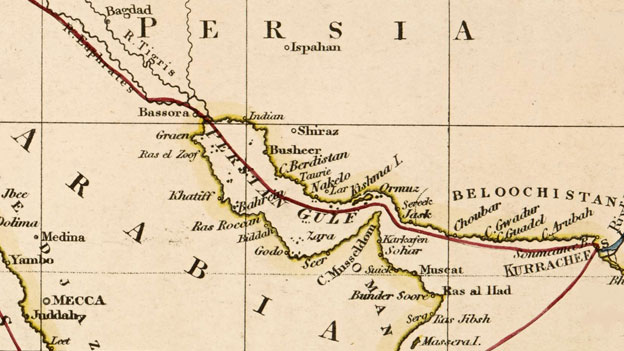 Back in August, I got a call from a PR at the British Library. They said they’d read my piece on Qatar in High Life magazine, and wondered if I’d be interested in something else to do with Qatar.
Back in August, I got a call from a PR at the British Library. They said they’d read my piece on Qatar in High Life magazine, and wondered if I’d be interested in something else to do with Qatar.
What followed was a heads-up about something which I’d already been vaguely aware of, but hadn’t properly focused on – the British Library’s ongoing partnership with the Qatar Foundation to digitise the UK’s India Office government records on the Gulf.
They invited me to the BL for a look around, and to chat with some of the curators working on this vast trove of material going back more than 250 years. I was impressed. Qatari money had, in effect, bought the BL a team of dozens of specialists, working on conserving, cataloguing, digitising and uploading paper records to a portal website that had itself been designed and built in-house from scratch. They flew me to Doha for a 3-day visit to talk to people at the Qatar National Library. The portal was due to launch in a matter of weeks.
I had lots of questions, many centred on the role of Qatar. The paper files will stay in London, but who owns the digital scans? Where is the portal – with its .qa domain – being hosted? Qatar was always pretty tangential in Gulf history compared to, say, Basra, Bahrain or Muscat: isn’t there a danger its sponsorship of this project could mislead people into thinking Qatar was more important than it actually was? Qatar censors its own media: would they censor this historical material too? Isn’t there a contradiction in Qatar – a notoriously restrictive country, which jails individuals for saying things deemed critical of the monarch – sponsoring the free, open, global dissemination of knowledge? Is the BL being taken for a ride? And so forth.
Those questions went down like a lead balloon. I got told off for asking them.
Nevertheless I wrote a story for the BBC to tie in with the portal launch – click here to read. The BBC also commissioned a ten-part weekly series of quirky stories from the newly digitised archives – stories which the BL’s curators have unearthed during their research, and which they generously pass to me. It’s fascinating. I feel rather privileged (and grateful) that they let me tinker with their stuff. I’m also having lots of fun writing up these little vignettes.
Part 1 is about an isolated telegraph station off the Omani coast.
Part 2 celebrates a minor official in Baluchistan and his over-familiar approach to office etiquette.
Part 3 picks out a British diplomat’s testy response to a Saudi request for money as being the start of US domination of Gulf politics.
Part 4 is about pearl-diving in the Gulf, with fabulous pics from London’s National Maritime Museum.
Part 5 tells the tale of a French secret agent in Persia – and his mysterious death.
Part 6 mixes the life-story of an independent-minded musician with rare early tracks digitised from 78rpm shellac discs.
Part 7 introduces the story of Britain’s pre-WW1 secret weapon in the Gulf: a monumental, 5,000-page gazetteer.
Part 8 is a brief overview of the lost Jewish communities of Arabia, with a fabulous music clip.
Part 9 tells the story of William Shakespear (not that one!), who began Britain’s relationship with Saudi Arabia.
Part 10 is about a local agent in Sharjah exposing the Sheikh’s pro-Nazi sentiment during WW2.
Part 11 gives an insight into British colonial influence in Kuwait, as a restaurateur is accused of serving cat-meat.
New stories go up every Saturday in the “Magazine Monitor” section of the BBC News website (top right on this page) – look out for them, from now until the end of January 2015. I tweet about them a lot @matthewteller.
A magazine in the US has also commissioned me to write a longer piece on the BL-Qatar partnership, looking at what I think are the fascinating implications of publication of these historical records en masse to a free-to-access website, both for academic study of the Middle East and for broader cultural relations between the Arabic- and English-speaking worlds. That will come in mid-2015, I expect.
.
.